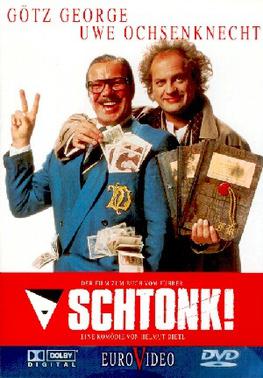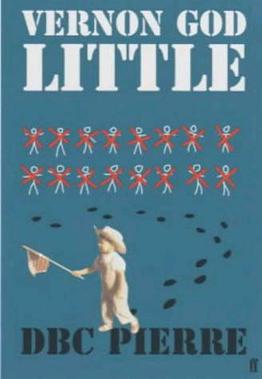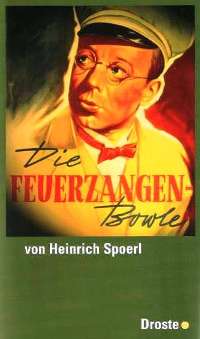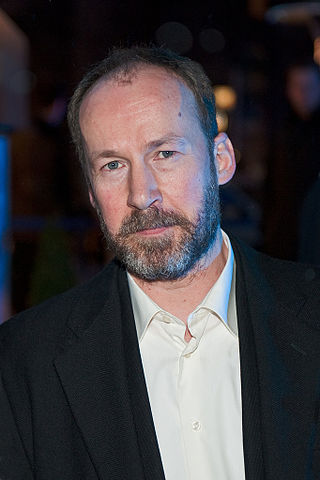Related Research Articles

Schtonk! is a 1992 German satirical film which retells the story of the 1983 Hitler Diaries hoax. It was written and directed by Helmut Dietl.

Vernon God Little (2003) is a novel by DBC Pierre. It was his debut novel and won the Man Booker Prize in 2003. It has twice been adapted as a stage play.

Uwe Johnson was a German writer, editor, and scholar. Such prominent writers and scholars as Günter Grass and Hans Mayer declared Johnson to be the most significant writer to emerge from East Germany. During the 1950s, he had troubles with the East German authorities, being treated as a "dissident" both for political reasons and for Modernist experiments in his works which made him opposed to the dominant doctrine of Socialist realism; after moving to West Berlin in 1959, he gained the label of "the author of the two Germanies", as, while criticizing East Germany as the state which betrayed the Socialist ideals, he didn't regard West Germany as a viable alternative and opposed the division of Germany in general. His works were dedicated both to East and West German societies and examined the relations between them.

Horst Tappert was a German film and television actor best known for the role of Inspector Stephan Derrick in the television drama Derrick.

Bibiana Beglau is a German actress.

Mephisto – Novel of a Career is the sixth novel by German author Klaus Mann.

Frank Goosen is a German cabaret artist and author.

Ulrich Tukur is a German actor and musician. He is known for his roles in Michael Haneke's The White Ribbon, Steven Soderbergh's Solaris, the docudrama North Face based on the 1936 Eiger climbing disaster in Switzerland, and as Wilhelm Uhde in Martin Provost's biopic Séraphine.

Sebastian Koch is a German television and film actor. He is known for roles in the 2007 Academy Award-winning film The Lives of Others, in Steven Spielberg's Bridge of Spies, and as Otto Düring in the fifth season of the Showtime series Homeland.

Die Feuerzangenbowle is a German novel, later adapted into several films, which tells the story of a famous writer going undercover as a pupil at a small town gymnasium after his friends tell him that he missed out on the best part of growing up by being educated at home. The story in the book takes place during the Weimar Republic in Germany. The novel by Heinrich Spoerl was published in 1933 and was adapted to film three times. The 1944 movie of the same name directed by Helmut Weiss is the most notable adaptation of the material.

Die Feuerzangenbowle is a 1944 German film, directed by Helmut Weiss and based on the book of the same name. It follows the book closely, as its author, Heinrich Spoerl, also wrote the script for the film. Both tell the story of a famous writer going undercover as a student at a small-town secondary school after his friends tell him that he missed out on the best part of growing up by being educated at home. The story in the book takes place during the time of the Wilhelmine Empire in Germany. The film was produced and released in Germany during the last years of World War II and has been called a "masterpiece of timeless, cheerful escapism." The film stars Heinz Rühmann in the role of the student Hans Pfeiffer, which is remarkable as Rühmann was already 42 years old at that time. The title comes from the German alcoholic tradition of Feuerzangenbowle. Rühmann had also starred in So ein Flegel, a 1934 version of the same novel.

Ulrich Noethen is a German actor who has appeared in many movies and TV films.

Jew Suss: Rise and Fall is a 2010 German historical drama film directed by Oskar Roehler, dramatising the creative process behind the antisemitic Nazi propaganda film Jud Süß (1940). It was nominated for the Golden Bear at the 60th Berlin International Film Festival.

Uwe Kockisch is a German stage, screen and television actor.

Ludwig Blochberger is a German actor. He is best known for his appearance in the coming of age movie Summer Storm dealing with issues around sexual orientation. He also appeared on German TV drama programmes including The Old Fox, Tatort and Brittany Mystery. Furthermore he portrayed the Chancellor Helmut Schmidt, in the TV documentary drama Helmut Schmidt - Lebensfragen.
Events in the year 1981 in Germany.

Babylon Berlin is a German neo-noir television series. Created, written, and directed by Tom Tykwer, Achim von Borries, and Hendrik Handloegten, it is loosely based on novels by Volker Kutscher.

Volker Kutscher is a German novelist, best known for his Berlin-based Gereon Rath crime series, which serves as the basis for the Sky thriller series Babylon Berlin.
References
- ↑ Kay, Jeremy (9 September 2003). "Liegen Lernen opens at three for Warner in Germany". Screen International . Retrieved 22 June 2022.